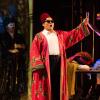
As the first big highlight landed midway through the first half of this year’s Merola Grand Finale concert, a charge ran through San Francisco’s War Memorial Opera House.
Soprano Lydia Grindatto, in the title role of Bellini’s Norma, and mezzo-soprano Simona Genga, as the conflicted Adalgisa, set off the spark in a vocally ravishing, emotionally penetrating duet. As the scene’s tension built, the young singers’ lustrous voices ascended in parallel and transparently converging harmonies. The audience on Saturday, Aug. 17, was so carried away that it interrupted the scene with applause before the number was through.
It wasn’t until the second part of the evening that another duet delivered a comparable effect. Singing in a voluptuously rich Russian — English supertitles were used, sometimes too sparingly, throughout the concert — the powerfully focused soprano Alexa Frankian and tenor Giorgi Guliashvili gave an expansive meditation on God, nature, and the universe in a duet from Tchaikovsky’s Iolanta, performing with a radiant, surging sense of purpose.

Singing in tandem was a dominant theme of Saturday’s performance as a cast of 29 young artists from around the world came together for the annual finale to the Merola Opera Program’s Summer Festival, concluding 12 weeks of serious study and collaboration. Of the 20 numbers on the bill, 16 were either duets or larger ensembles. In a sense, that balance confirmed what three former Merola singers, or “Merolini,” said in pre-curtain remarks about the importance of the “community” that the training program fosters.
The selections were striking in another way. Dramatic, romantic, and lyrical singing formed a strong through line. There was nothing from the Baroque era and only a smattering of coloratura or other overtly athletic vocalism. That’s not to suggest the Grand Finale was lacking in ambition. Again and again, albeit with uneven results, the singers rose to the challenge of soaring vocal lines, technical demands and expressive range. Rossini, Bellini, and Richard Strauss — quite different composers — were each represented on the program by two contrasting numbers.

Baritone Sihao Hu got the evening off to a sparkling start with a bumptious and speedily adroit account of Figaro’s famous patter aria from The Barber of Seville. If a male ensemble didn’t quite nail a trio from Rossini’s The Italian Girl in Algiers, bass-baritone Benjamin R. Sokol brought some brawny heft to the occasion. Sokol and baritone Hyungjin Son followed the aforementioned Norma triumph with a display of crisply patriotic fervor from Bellini’s I Puritani. Soprano Mary Hoskins scored the Strauss winner in a probing selection from The Egyptian Helen.
The second half of the bill featured some contemporary selections. In a scene from San Francisco composer Jake Heggie’s Dead Man Walking, mezzo-soprano Lindsay Martin and soprano Elizabeth “Hanje” Hanje brought an intimate emotional complexity to a number that could have been truncated. Bass-baritone Justice Yates delivered an anguished, driven performance of the aria “Lord, take this wanting from me” from Terence Blanchard’s Fire Shut Up in My Bones, the acclaimed second opera created by the jazz trumpeter and executive artistic director of SFJAZZ. In an aching refrain, Yates gave the paradox of a single phrase — “changed, but still the same” — the torque of the Black American experience.

Dressed in formal wear — tuxes for men, ball gowns for women — the Merolini decorated an otherwise somber stage. Two curved gray facades from the set for San Francisco Opera’s forthcoming production of Tristan and Isolde rose behind them. Difficult as it is to stage an omnibus program, stage director Anna Theodosakis brought no particular spark to the production. It was a different story in the pit, where conductor Steven White led the fine orchestra with dexterity and responsiveness.
The mood lightened and sweetened as the three-hour evening wound to a close. Soprano Tessa McQueen, as a masquerading partygoer, teamed up with tenor Michael John Butler in a flirtation scene from Johann Strauss Jr.’s Die Fledermaus. The two made the scene both silly and sexy with their teasing stage business; never mind that their singing wasn’t as bright.

Comparisons may be invidious, especially with singers just at the start of their hoped-for careers, but audiences — and critics — will make them anyway. When Grindatto, who delivered another hair-raising turn in the intense sextet from Donizetti’s Lucia di Lammermoor, got to waltz in the penultimate scene, the deal was sealed. Lithe in voice and step and ably partnered by tenor Samuel White, she danced away with best-in-show honors in a larky number from Emmerich Kálmán’s Die Czardasfürstin.
The entire company gathered onstage for a sweetly sentimental farewell, Noël Coward’s “I’ll see you again,” arranged by Ronny Michael Greenberg. Belting out their last number together, these Merolini gathered as if they were posing for a yearbook photo before going their separate ways.
This story was first published in Datebook in partnership with the San Francisco Chronicle.




